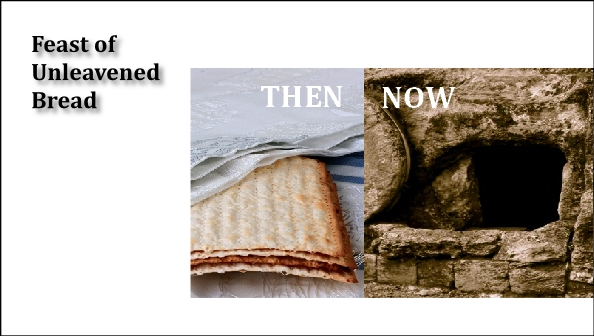By Tyson Thorne

Today starts the second feast of the Lord, the Feast of Unleavened Bread. A week-long celebration, it begins the day after Passover and is often lumped in with that feast and called the 8 days of Passover.
While Passover celebrates the Hebrews’ release from slavery, the Feast of Unleavened Bread remembers their hasty departure. When on the run, there is no time to wait for bread dough to rise, and consequently all the bread was unleavened. This is the very practical reality of the feast but, as mentioned yesterday, each of the Lord’s feasts have an historic and literal reality as well as a prophetic and symbolic meaning.
In this case the symbolism is wrapped around sin. Throughout the New Testament leaven is often a metaphor for sin (Matthew 16.6-11, Mark 8.15, Luke 12.1 and Galatians 5.9), and even in the Old leavening was seen as impure and could not be used in the Temple (Leviticus 2.11, 6.16-.17 and 10.12).
As with all of the Feasts of the Lord, the prophetic meaning is discovered in the work of the Messiah. While Passover depicts the Messiah as the Lamb sacrificed for our sins, the Feast of Unleavened Bread depicts the burial of the Messiah. As a sinless (unleavened) sacrifice, God did not permit his body to suffer the indignities of a criminals death (Isaiah 53.9, Matthew 27.57-.60) nor to suffer decay (Psalms 16.10) like dough soured by leaven, but instead rose from the grave proving his authority over the divine curse of death (Genesis 3.19) and sin (Hebrews 9.26).
In preparation for this feast, the family made certain no leaven could be found anywhere in the home. All leavened breads were burned in a fire, kitchens were swept clean, the pockets of garments were turned inside out before being washed, all to make sure the home was completely clear of all leaven. No leaven is even permitted to be in view during the seven day celebration.
Oh but that we were so diligent about sin! What would our lives look like if we daily spent time in prayer confessing our sins and sweeping the corners of our minds so that no trace of it could be found? Thankfully the Messiah, one without sin, became sin for us that we might be pardoned of all our wickedness and be found righteous in God’s sight.
|
|
|